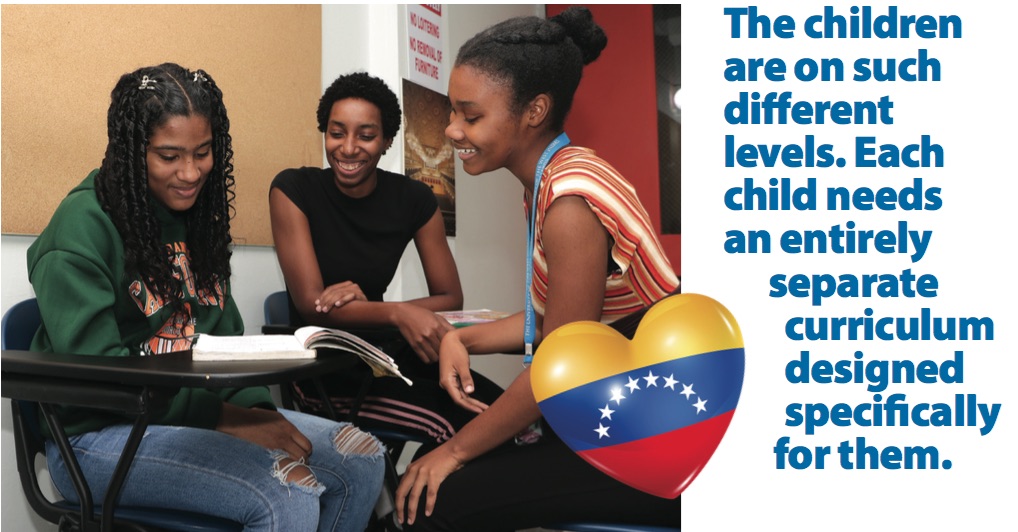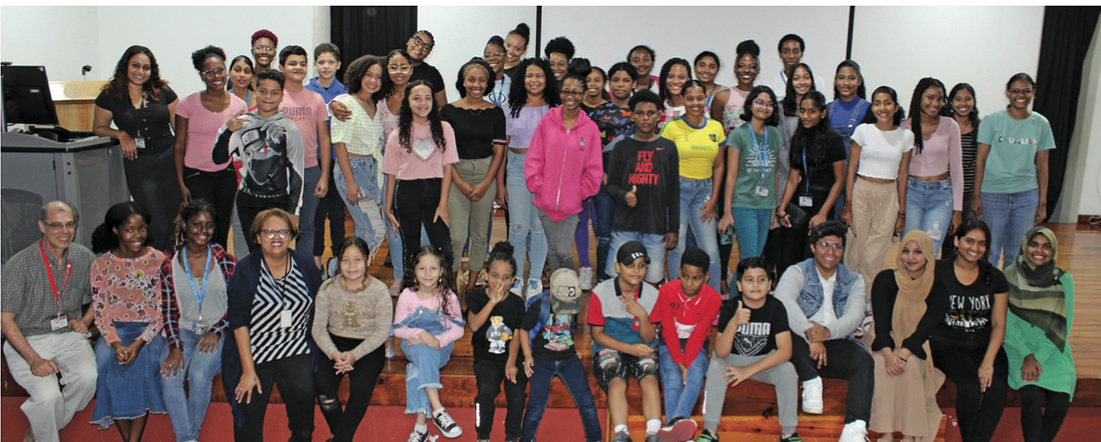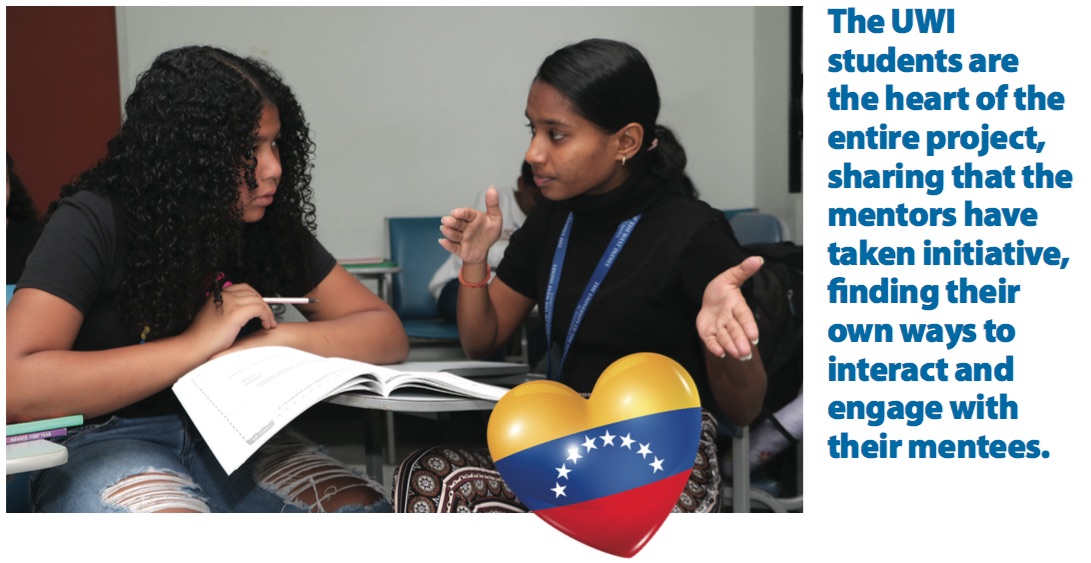UWI volunteer pilot project gives students the opportunity to make a difference by mentoring Venezuelan migrant children in English and other primary school basics
If you happen to be on The UWI’s St Augustine campus on a Thursday afternoon and walk past the Centre for Language Learning (CLL), you’ll likely be met with a curious sight – kids, some as young as five, chatting intently with UWI students at their sides.

PHOTOS: ANEEL KARIM
Snippets of their conversations may reach your ear and you might smile at the excitement, even wonder, in the small voices. Your brow may furrow slightly at the halting English words that tumble out, sometimes buffered by easy Spanish, as you hazard a guess at what’s going on. What you would be witnessing is the UWI Student Volunteer Pilot Project for Migrant Children in T&T, an initiative aligned with the UWI Community Engagement Framework, designed to help prepare Venezuelan migrant children for entry into our country’s primary schools.
Simply called the Migrant Mentorship Programme by those involved, this project is an undertaking of the Faculty of Humanities and Education’s (FHE) Department of Modern Languages and Linguistics (DMLL) and the CLL. Led by CLL Director Dr Nicole Roberts, and DMLL Instructor Mr Mr Rómulo Guédez-Fernández, it pairs UWI students (mentors) with migrant children (mentees) to teach them English and other primary school basics.
This project was initiated when, in July 2023, the Government of Trinidad and Tobago announced intentions to integrate Venezuelan migrant and refugee children into T&T’s primary school system. UWI St Augustine Campus Principal Professor Rose-Marie Belle Antoine saw an opportunity for the university to assist in a meaningful way. With most migrant children having little command of the English language, she knew they would need some preparation if they were to cope, let alone succeed, in our schools.

“The education of our migrant children has been a longstanding concern of mine,” Professor Antoine shares. Knowing that the FHE was already involved in work with migrants, and believing the DMLL to be perfect for this initiative – “With our language experts, who better to teach native Spanish speakers?” – she reached out to the faculty’s dean, Professor Elizabeth Walcott-Hackshaw.
Professor Walcott-Hackshaw then involved Dr Roberts and Mr Guédez-Fernández, and they devised a plan of action.
An earlier project, the administration of the English as a Second Language Proficiency Test of Spanish-speaking migrant children in Trinidad and Tobago (meant to assess the English-language proficiency of Venezuelan migrant children), revealed that these children were not only weak in their English-speaking skills, but also in the basic subject areas crucial at the primary school level – creative writing, reading comprehension, and mathematics. Called “the Testing Project”, it was a collaborative initiative between the Catholic Education Board of Management, PADF and UNICEF, in partnership with The UWI.
Jesse Ragbir, UWI postgraduate student, Migrant Mentorship Programme Assistant Coordinator, and evaluator with the Testing Project shares that “A lot of these children [need] remedial help because many of them haven’t been in school at all”, and they struggle with reading and writing, not just in English, but in Spanish as well.
With this information, Dr Roberts and Mr Guédez-Fernández set out to craft the Migrant Mentorship Pilot Programme.
Security and ease of access being top priority, UWI’s CLL building became the designated programme headquarters, and invitations to participate were extended to migrant families living near enough to the campus for the children to attend on Thursday afternoons.
Then came the time to gather the mentoring troops.
It was important to Professor Antoine that the volunteer project be a cross-faculty initiative, giving every student an opportunity to be involved.
“I felt many students would want to serve,” she says.
So, a call went out to the UWI student community, inviting those interested in joining the programme as mentors. It turned out she was right.
“We were really surprised [at] how much the students took to the idea,” Dr Roberts says. “We got a number of UWI students, not just from Humanities, and that was really nice to see.”
Academic staff were also happy to become involved, Mr Guédez-Fernández adds, including Prof Walcott-Hackshaw who guided and supported the team, Faculty of Social Sciences’ Professor Surendra Arjoon who helped prepare the mentors for their teaching roles, as well as the History Department’s Professor Jerome Teelucksingh.
“So we have synergy between students, academic staff,” and even the CLL’s administrative staff, Mr Guédez-Fernández says.
The Migrant Mentorship Pilot Programme kicked off with its first session on Thursday, September 14, 2023, with 20 migrant children from four to 14 years old, 40 UWI student volunteer mentors and four assistant coordinators.
There were initial challenges, Rómulo shares, including creating a curriculum that catered to the children’s different age ranges.

Student volunteer mentors, mentees, and the coordinators of the programme share a moment. At left (sitting) is Mr Rómulo Guédez-Fernández, and Dr Nicole Roberts is seated fourth from left.
Recent UWI graduate Talia Khan – another Testing Project evaluator and Migrant Mentorship Programme Assistant Coordinator – says that the children’s levels of proficiency in speaking and writing English also vary, not just between the age groups, but individually.
“The children are on such different levels. Each child needs an entirely separate curriculum designed specifically for them,” she says.
To address this problem, Mr Guédez-Fernández says, they create material specific to the various levels of the children, for each subject, adapted to the primary school curriculum.
Talia explains that the coordinators create these worksheets and make them accessible to the mentors who then pick their own activities for each session. And, they are learning, Talia says of the children. “They are developing that English competency, as well as the math skills.”
Witnessing this, she says, “is very fulfilling.”
Jesse adds that it is particularly rewarding to see the children so excited to learn: “These mentorship classes are the first time that they are having some sort of semi-formal education, so a lot of them really look forward to it.”
The UWI students involved also benefit considerably, Mr Guédez-Fernández shares, from building teaching skills, to developing proficiency in the content areas they teach, as well as, of course, in the Spanish language.
“They feel really happy in terms of the experience they have,” he says.
Dr Roberts acknowledges some of the students’ initial discomfort with speaking Spanish as their language skills may not have extended past the form three level. “But now, because they're interacting with these kids weekly, they are comfortable with the language.”
“The UWI students are the heart of the entire project,” says Talia, sharing that the mentors have taken initiative, finding their own ways to interact and engage with their mentees. For example, those with the youngest mentees, “who would be a bit more hyper than the others”, have learned to take them out of the classroom. “They show them the signs around the CLL building, they point to the wall and say, ‘So, what colour is this?’ or ‘What does the sign say?’”
Amisha Pooran, FHE Spanish and Linguistics student in her second year and mentor for an 11-year-old boy, shares that “he looks forward to the sessions every Thursday as much as I do.” To her, “education is a human right and should be accessible to all”, so she is happy to be part of an initiative like the Migrant Mentorship Programme.
The mentees and mentors now share a bond, Talia says, recalling that when the children were invited on stage to say a few words at their Christmas gathering last year, “they all said that they’re thankful to their Miss or to their Sir, and they learnt a lot and can’t wait to come back.”
The mentor responses are just as heartening. “This is a transformative experience! It changed me,” some have told Mr Guédez-Fernández. They’ve also expressed heightened cultural awareness and awareness of the educational needs within the Venezuelan migrant community.
Observing parents and grandparents waiting for their children on the first day of the programme, some UWI students approached Mr Guédez-Fernández and Dr Roberts with a proposal – the CLL should host an English as a Second Language class for them while they wait for their children. So now, Mr Guédez-Fernández says, “There is a class for parents,” taught by two UWI students.
Noting that the students had no training in teaching, he says, “We sat down with them and created a very simple lesson. Now they are learning how to teach English as Second Language (ESL) by doing it.”
In addition to the skills that they build, the connections they make and the benefit of doing good for others, the UWI student mentors are awarded a certificate of participation at the end of each semester.
Now into the second semester and second leg of the Migrant Mentorship Programme, Dr Roberts is confident that the pilot project has been a success. And this, she said, is just the start, acknowledging that while the legislation that sparked this programme hasn’t yet been passed, these children aren’t in school and the programme gives them an opportunity to learn.

“We're going to have to find a way to deal with levels,” she says. “We cannot only continue with these 20 mentees, because there are other kids out there. So, we're going to have to find a way to adapt.”
Mr Guédez-Fernández reveals plans to offer summer classes under the Teaching English to Speakers of Other Languages (TESOL) programme, for any migrant who needs it. And, of course, they intend to keep the Migrant Mentorship Programme going and growing as far as possible, with talks of introducing the programme to Jamaica and Barbados.
Though funding is limited, the programme receives donations of books and materials from individuals as well as sponsorship for snacks and drinks from Massy Stores. The goodwill extends beyond the university.
“You can’t sit back and think about the funding,” Dr Roberts says. “The rest will come. We’ve been fortunate so far.”
“It really does take a lot of different brains, a lot of effort and heart, to figure out how to resolve this whole dilemma,” Talia acknowledges.
While the country waits for the legislation to be passed, and school cycles move forward, and these migrant children get older, one thing is certain – all the hearts and hands involved in UWI’s Migrant Mentorship Programme will keep teaching and learning at the CLL on Thursday afternoons.